The “good German” in war movies
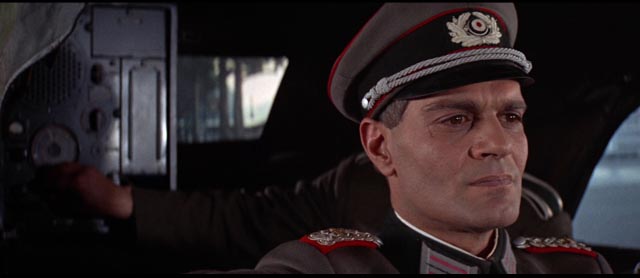
By coincidence, just a few weeks after re-watching Bernhardt Wicki’s Die Brücke, I’ve also watched two other movies dealing with Germany during the Second World War. These two, much larger in scale, are Hollywood productions and they offer some interesting points of comparison with Wicki’s film. Die Brücke, while it displays genuine empathy for its characters, makes no attempt to present us with the figure of “the good German”; the teenage boys at its centre have been corrupted to the core by the Nazi regime and willingly waste their own and others’ lives to support an already lost cause, while the adults around them have been complicit with the regime, or at best have kept silent about their dissatisfaction with it. The two American movies, on the other hand, both pivot on this problematic trope, although one was based on a successful novel by an American writer, while the other was based on a novel by a German author.
Although the Nazis had managed to create an almost monolithic new Germany in their own image, there were undoubted elements of resistance throughout their twelve-year reign. Some people were unwilling to accept the Nazi worldview, but many if not most of these opponents were eventually crushed by the regime. The student-led White Rose underground in Munich was briefly active in 1942 and early 1943, distributing leaflets urging people to stand up to the Nazis; its leaders were arrested, tried for treason and executed by beheading. Hans Fallada’s brilliant novel Every Man Dies Alone (aka Alone in Berlin, 1947) was based on an actual case in which an ordinary couple, devastated by the death of their only son in the war, began to leave postcards in public places trying to raise some awareness in the public of the crimes of the regime; this couple too was arrested, tried and executed by beheading. But the trope of “the good German” doesn’t usually deal with this kind of active resistance; rather, it tends to deal with the idea of decent people who somehow were simply not aware of what was being done in their name.
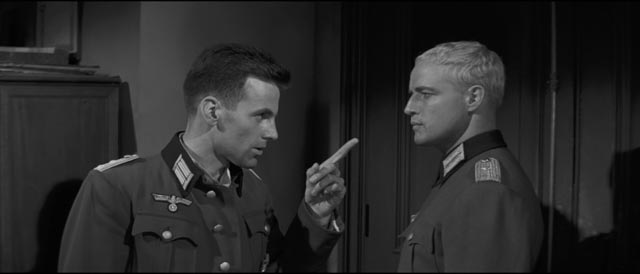
Immediately after the war, there was incredulity among the victors about this kind of obliviousness and one of the central tenets of the Nuremberg trials was that claims of ignorance were unconvincing and that people at all levels of German society were complicit to some degree in the Nazis’ crimes. The regime certainly made no attempt to conceal their aims and methods, passing laws which gradually stripped away the rights of all “undesirables”, openly attacking Jewish businesses and individuals in full view of the public, running trains full of prisoners on railways which passed through many towns on their way to the camps. And yet, thanks to very effective propaganda and deep, long-held prejudices in society as a whole, many Germans accepted this situation with equanimity – not only were they not personally affected by these oppressive measures, they believed that the victims deserved this treatment.
In their commentary on Twilight Time’s Blu-ray of Edward Dmytryk’s The Young Lions (1958), Julie Kirgo, Lem Dobbs and Nick Redman point out that by the time the movie was made thirteen years after the end of the war, it was possible for the victors to show more understanding and empathy for the former enemy, thus making it possible for the film to present a sympathetic “good German” in the form of the Wehrmacht lieutenant Christian Diestl. And yet, in order to make him sympathetic, it was also necessary to make him extremely, even implausibly naive, learning only slowly over a period of years that the regime he serves is not what he thought it was. This isn’t simply an opening up of understanding of the individual German after the war’s enmity had faded; but the question is what, exactly, was behind it? No doubt it was at least partially due to the casting of Marlon Brando in the role, an important and popular actor who could not have portrayed the character as written in Irwin Shaw’s novel: in the book, he was more like an adult version of the boys in Die Brücke, a true believer corrupted by a corrupt government. Oddly, in the movie, Diestl becomes the most sympathetic of the three protagonists, his ultimate fate seen as a tragic waste. (Shaw was apparently very displeased with this alteration of his work.)
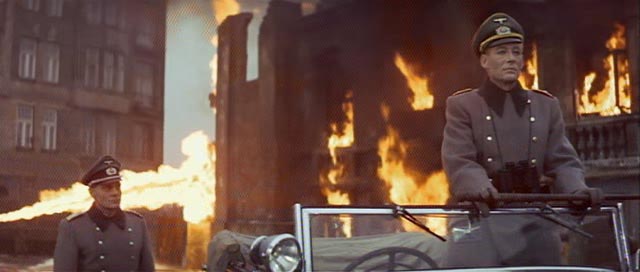
But beyond the distortions imposed by star casting, there was perhaps a larger political purpose behind the cleansing of Diestl. The movie was made at the height of the Cold War, a time in which Germany had become an important ally against the Soviet Empire, a time in which in a number of ways the crimes of Nazi Germany had become an embarrassing distraction better swept under the rug. By separating this decent character from the heinous regime he served, it was possible to see that ordinary Germans were not actually responsible or complicit in Nazi crimes. In its small way, The Young Lions represented an element in the rehabilitation of German society, with Diestl’s death a kind of sacrificial act of atonement (apparently Brando himself had wanted him to die with arms outstretched Christ-like, a suggestion which Dmytryk was wise to ignore).
By 1967 when Anatole Litvak directed The Night of the Generals, adapted from a novel by the prolific former soldier and Nazi Hans Hellmut Kirst, this issue of rehabilitation had pretty much run its course and it was possible to simply tell a story set in Nazi Germany and the Occupied countries in which one main character, the military policeman Major Grau (Omar Sharif), was a decent man just trying to do his job honourably – in this case, investigating a brutal murder. As a character, he doesn’t have to carry the symbolic weight which burdens Diestl, and so in a way represents the triumph of that process of rehabilitation. Neither saint nor monster, Grau is recognizably “just a man”, someone the viewer can easily identify with.
*
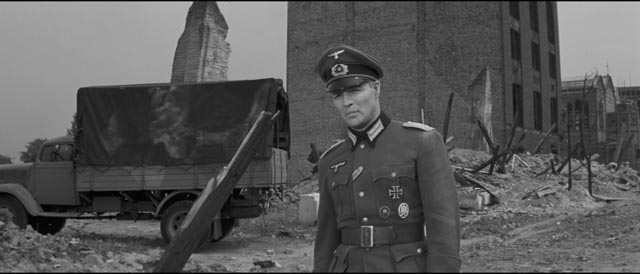
The Young Lions (Edward Dmytryk, 1958)
Edward Dmytryk’s The Young Lions (1958) was adapted by Edward Anhalt from Irwin Shaw’s first novel, published in 1948 and often linked with Norman Mailer’s The Naked and the Dead, James Jones’ From Here to Eternity and Herman Wouk’s The Caine Mutiny as the key American literary works coming out of the War. By telling three parallel stories, about two American soldiers and a German, Shaw’s aim was to present a sweeping portrait of the war from multiple points of view. As already mentioned, the German, a committed Nazi in the book, becomes in the film a politically naive man who begins by believing that Hitler can restore Germany to its former greatness, but gradually becomes disillusioned by the brutality and pointlessness of the war. In the end, having belatedly become aware of the extermination camps, he loses his will to go on and essentially commits suicide by enemy soldier. The biggest criticism that can be leveled against him is that he’s simply thoughtlessly apolitical until it’s too late.
Somewhat oddly for a big budget Hollywood movie, Diestl comes off more sympathetically than the two American soldiers whose stories make up the rest of the film. Noah Ackerman (Montgomery Clift) is a scrawny, hyper-neurotic Jew who willingly joins the infantry only to find himself brutalized by his fellow recruits and officers (the film is somewhat cagy about the obvious anti-semitism behind this treatment), until his ability to accept the brutality finally wins him his platoon’s grudging respect – an acceptance aided by a military system which, when it becomes aware of the abuse, punishes the officer responsible, thereby reaffirming that the prejudice is personal and not institutional. But Ackerman also – almost – has to deal with prejudice outside of the military when he falls for a non-Jewish small-town blonde, Hope Plowman (Hope Lange, the most likeable character in the movie), whose father just for a brief moment expresses a distrust of Jews … only to abruptly accept him because, well, Noah is his daughter’s choice.
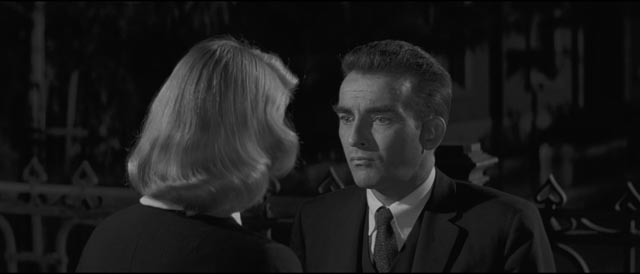
The third corner of the triangle is Broadway performer Michael Whiteacre (Dean Martin), a self-professed coward who does whatever he can to stay out of harm’s way. These efforts cause him a lot of personal torment, the mixture of a desire for self-preservation with deep guilt making him bitter and sarcastic. It’s not the cowardice so much as this bitterness which causes problems with his girlfriend Margaret Freemantle (Barbara Rush); inevitably the conflict with her finally forces him to accept his place and head for Europe after D-Day to join the fighting.
This was Martin’s first role after breaking up his partnership with Jerry Lewis and it reveals him as a convincing serious actor. Clift, on the other hand, in his first role following the famous car crash which caused serious facial injuries, gives an uncomfortable performance as Ackerman, his jittery, neurotic mannerisms telegraphing his status as a victim, which subsequent events (his acceptance by his fellow soldiers, his marriage to Hope, his heroism under fire) can never quite erase. These two characters come to seem like diversions from the movie’s central story of Diestl’s disillusionment, resulting in a final impression that The Young Lions is the tragedy of a decent German betrayed by his country, which has drifted down the wrong path. Throughout the movie, Diestl refuses to obey immoral orders without consequence, yet at the end he seems to take on the guilt of his nation and willingly accepts his punishment.
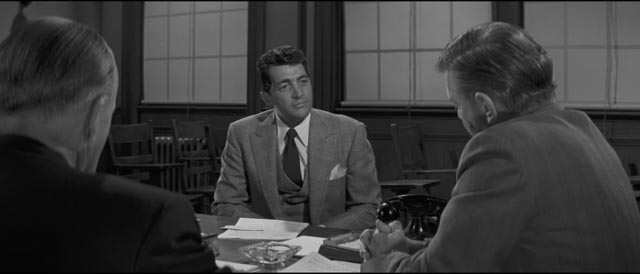
The movie is a rather plodding and shapeless affair, never really finding a way to move meaningfully from one narrative thread to another until the rather abrupt and arbitrary climax in which the now-unarmed Diestl encounters Whiteacre and Ackerman just after everyone has discovered the horrors of the concentration camps. The major change here from the novel lies in the almost casual way Diestl is killed by Whiteacre (providing Brando with an impressive moment), whereas in the book Diestl, unredeemed to the end, shoots Ackerman and is then in turn shot by Whiteacre. In the film’s version Ackerman, the Jew who has just discovered what the Nazis have done in the camps, is oddly extraneous to the climax.
Glenn Erickson at DVD Savant is adamant that The Young Lions is a very badly made film (an opinion with which Julie Kirgo, Lem Dobbs and Nick Redman disagree on the Twilight Time disk’s commentary), asserting that Dmytryk never recovered as a filmmaker from his experience as one of the Hollywood Ten and his subsequent recanting and naming of names. Certainly, before that experience he had been an efficient studio workman who occasionally transcended the limitations of B-movie material – and made several notable films noirs – while afterwards he tended to make somewhat bloated “prestige” movies like this and its immediate predecessor Raintree County (1957), eventually sinking to the embarrassing depths of Bluebeard (1972). There isn’t much directorial personality on display in The Young Lions and a quick comparison to another epic from five years later, Carl Foreman’s The Victors, does seem to indicate that Dmytryk really had no personal conviction about the material here. While Foreman’s film is similarly bloated, and certainly flawed, it is nonetheless carried, and given stature, by Foreman’s passion for the material.
*
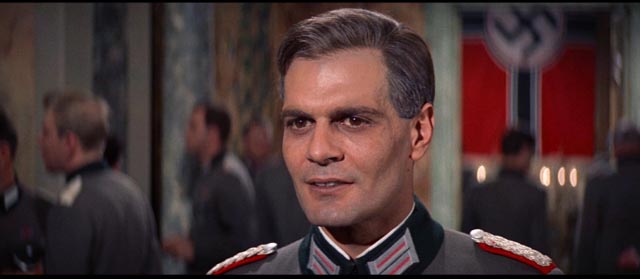
The Night of the Generals (Anatole Litvak, 1967)
Anatole Litvak’s The Night of the Generals (1967, and also newly released on Blu-ray by Twilight Time) was based on a novel by Hans Hellmut Kirst. Kirst had been both an officer in the German Army and a Nazi, although after the war he claimed not to have known about the party’s “excesses”. Beginning in 1950, he established a successful career as a novelist, writing numerous books about life under the Nazis and during the war, many with a satirical bent. The script for Night of the Generals was co-written by Paul Dehn (whose work ranged from Seven Days to Noon to Goldfinger, from The Spy Who Came In From the Cold to the four Planet of the Apes sequels) and novelist Joseph Kessel (whose books include Belle de Jour and Army of Shadows) and it displays some of the familiar weaknesses which characterize many big multinational productions of the ’60s, in which logistics sometimes overtook creativity. Nonetheless, The Night of the Generals, though rather slackly paced, is a more interesting film than The Young Lions, structured as three parallel narratives set both during the War and in the 1960s. Unlike The Young Lions, this film manages to integrate the various elements so that they all tie together thematically.
Anatole Litvak, born in Ukraine in 1902, had an interesting career. Having witnessed the Russian Revolution, he entered the film industry in Leningrad before emigrating to Germany in 1925, where he edited Pabst’s Joyless Street, and began directing a few years before the Nazis took power. In the mid-’30s, he moved to Paris where his international success with Mayerling in 1936 led to a contract with Warner Brothers and a move to Hollywood where he made comedies, dramas and, eventually, wartime documentaries. After the war, he made both The Snake Pit and Sorry, Wrong Number in 1948, earning both Olivia De Havilland and Barbara Stanwyck Oscar nominations; eight years later he helped Ingrid Bergman win the award for the lead in Anastasia. Litvak’s work exhibits a sophistication and eclecticism appropriate to his background, but perhaps his best qualities – including a rapport with leading actresses – weren’t really called on for his second to last film, The Night of the Generals, which has a certain impersonality common to multinational productions of the time.
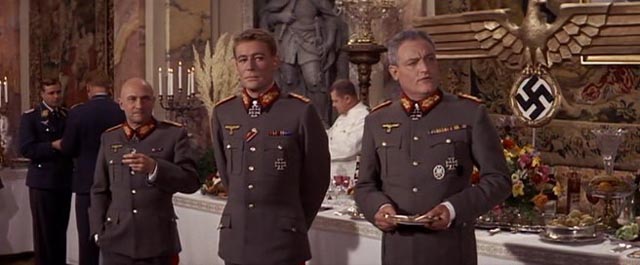
The sprawling narrative of the film begins in Warsaw in 1942 with the brutal murder of a prostitute. Major Grau (Omar Sharif), a military policeman, initially takes no interest … until a witness claims that the apparent killer was wearing the uniform of a German general. This fact spurs Grau to begin an investigation which is resented by his superiors. In the midst of a brutal war, why should this one murder matter? Grau’s sense of justice and order prompts him to pursue the killer, who may be one of three men: the politically slippery General von Seidlitz-Gabler (Charles Gray), the weaselly General Kahlenberge (Donald Pleasence) or rising star General Tanz (Peter O’Toole). The mystery is pretty obvious because of both the casting and the quality of the performances – O’Toole is at his most neurotically intense from the moment he comes on-screen, obviously a man with unsavoury appetites and a love of war and violence. The sexual brutalization of prostitutes is merely a more personally satisfying form of the larger-scale slaughter he delights in.
But while this is obvious, the film’s interest lies in the larger narrative intricacies which have the other two generals involved in the 1944 plot to assassinate Hitler – Kahlenberge very deeply, von Seidlitz-Gabler with less commitment. Two years after the first murder, Grau, now in Paris, comes across an identical case, with the three generals once again in the vicinity. Reopening his investigation, he comes inadvertently close to exposing the assassination plan, while the fall-out of that attempt defeats Grau at the moment he tries to make an arrest, permitting Tanz to get away with his personal crimes. The narrative’s ironies are quite thick – the importance of a single death in the midst of a war which killed tens of millions; the failed attempt to bring that war to an end enabling a killer to escape justice …
The third thread of the story involves the French policeman Inspector Morand (Philippe Noiret), who befriended Grau in Occupied Paris, recognizing in the German officer a man who shared his own sense of justice. When, in the mid-’60s, a similar murder of a prostitute occurs soon after Tanz has been released from prison, where he was serving time for his war crimes, Morand, now an Interpol agent, goes to a reunion of Tanz’s old regiment where the ageing general is the guest of honour. Morand here manages to complete the investigation left unfinished in 1944 by the death of Grau.
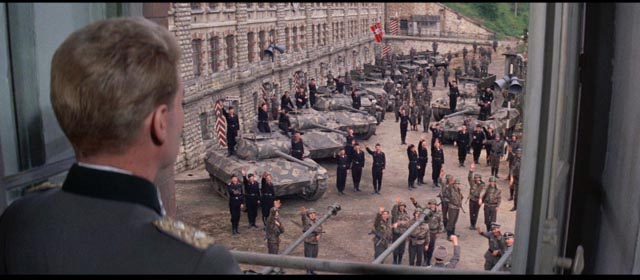
To a degree, the background narrative – the plotting and politicking of the generals, the assassination attempt, and so on – is more interesting than the rather perfunctory crime story, and the film would be much stronger if the mystery element was more effectively developed to create some genuine suspense parallel to the suspense arising from the assassination attempt. With more emphasis falling on that attempt, Grau’s position as “the good German”, following his conscience even through the violent chaos of the war, seems less like that of the film’s protagonist than of a merely supporting character, an effect magnified by his absence from the story’s conclusion. In addition, his focus on the individual crimes committed by Tanz perhaps inadvertently suggests that within the context of the war and the greater Nazi crimes, a decent man would be helpless to affect larger events, that decency itself is in the end ineffectual (there is no suggestion that the generals’ plot against Hitler has anything to do with decency: it’s rather a matter of politics and self-interest, a recognition that if Germany is to survive in any way, the madman must be removed before destruction becomes complete).
Neither The Young Lions nor The Night of the Generals is entirely successful, but Litvak’s film offers a more nuanced and honest treatment of its German characters and makes less excuses for the role of its “good German” within its narrative framework. The plea for Diestl’s decency in Dmytryk’s movie is naive at best, more likely simply dishonest, allowing its star Marlon Brando to come across as sympathetic without any complications to confuse the audience.
Both Twilight Time Blu-rays provide excellent transfers, but it’s a pity a commentary has only been provided for the duller film. (Note: Eureka released an improved edition of Night of the Generals in 2019, which does include an informative commentary track by author Scott Harrison.)
That commentary is wide-ranging and discursive, covering the literature which came out of the war and the treatment of those massive novels by Hollywood, but also going over the communist witchhunt of the late ’40s and early ’50s, Dmytryk’s role as one of the Hollywood Ten who, after being sent to prison, not only recanted and named names, but also invented accusations against others in the film industry. Where Glenn Erickson sees his subsequent work as that of a defeated man who lost his integrity, Kirgo, Dobbs and Redman see the opposite: a man tormented, who was continually working out his own sense of guilt through his movies. Oddly, although all three agree at the start that The Young Lions is an impressive melodrama (Kirgo begins by saying “I love this film”), they spend much of their time discussing errors in casting, weaknesses in Anhalt’s script and some of Dmytryk’s staging, and even the failings of the source novel (and its genre). By the end of the track, I found it rather difficult to understand their initial enthusiasm for the movie.
Comments